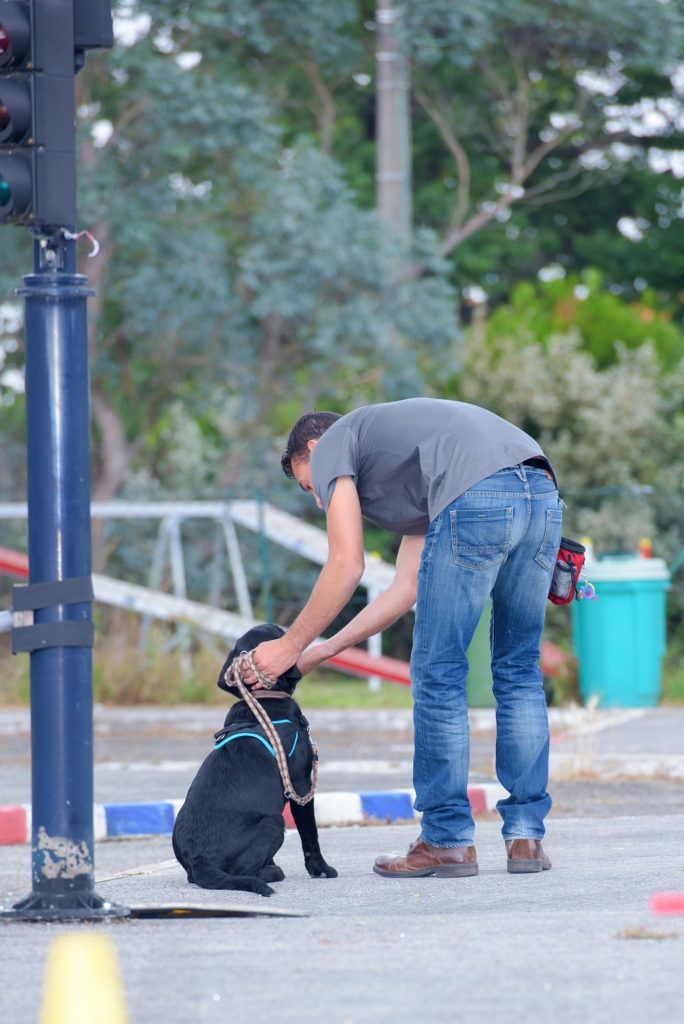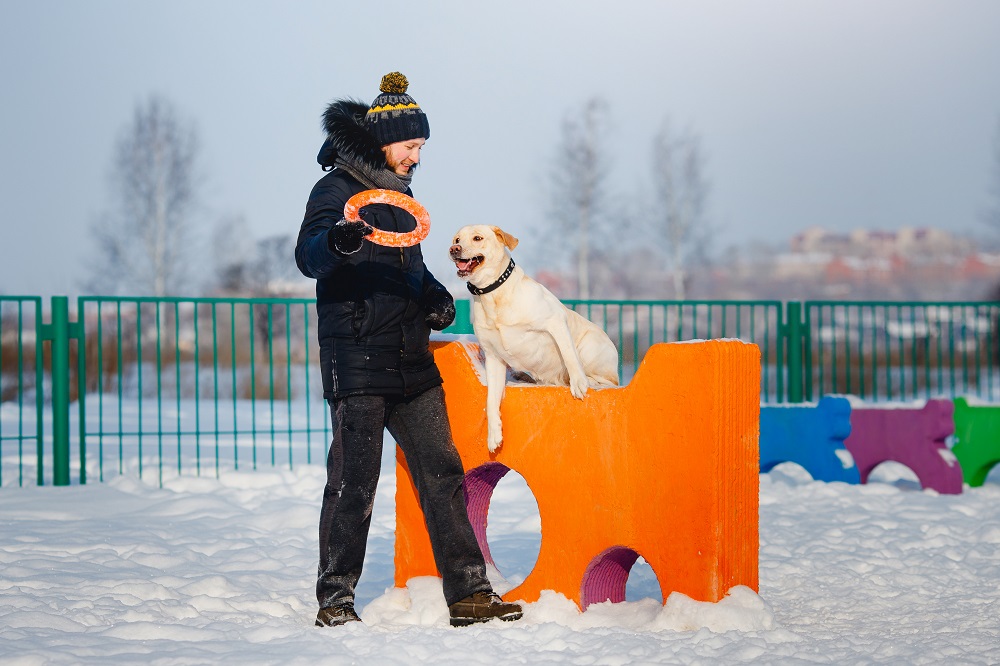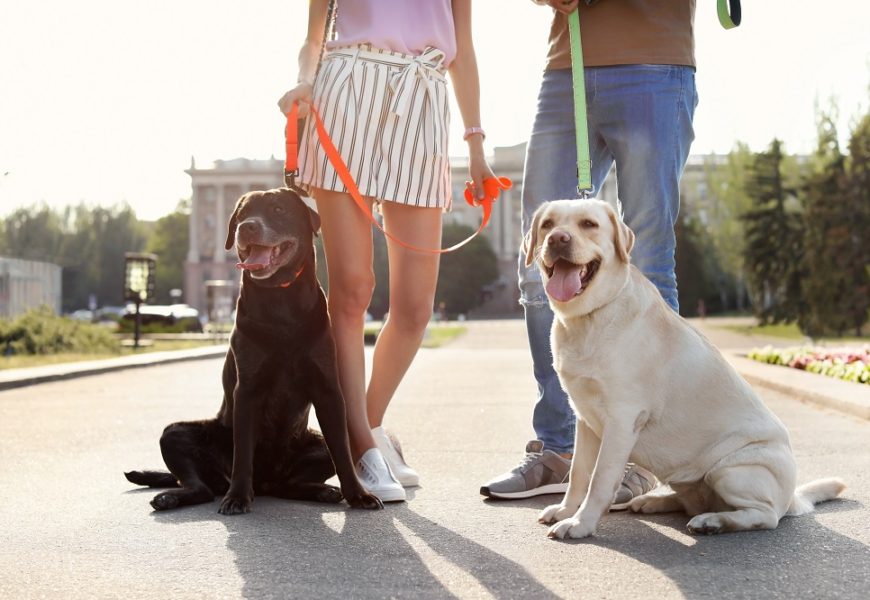Every good Labrador deserves a good education, including yours! With winter upon us, now is a great time to enroll in a class and round out your activities with your Lab. Winter is the time when the kids are in school and most of us don’t go on vacation, so we have some extra time to spend on our Lab’s behavior. When we get the kids ready for school, most of us have some idea about what to expect based on our experiences as students ourselves, but what should you expect when you get ready to go to school with your Lab?
When to Start?
For many years, The American Veterinary Society of Animal Behavior (avsab.org) has been recommending that puppies can start before they are fully vaccinated. In my school (in Canada), we allow puppies to start in-person classes at eight weeks of age, but we make sure that there are no adolescent or adult dogs in the training hall with these youngsters. Early puppyhood classes can really give you a head start on self-control, handling, and manners, all issues that are important in an adult Labrador.
Most people think that puppy class should cover sit, down, come, and walking on a loose leash, but these behaviors are often just the hook to get you to teach your puppy the things that matter most. Learning how to meet new people, how to play nicely with other dogs, and how to accept veterinary handling and care are the real skills you will learn in puppy class.
Your Labrador may no longer be a puppy, but that doesn’t mean that going to class won’t be of benefit. Generally, the sooner you go to class the better, but there is no age that is too late to learn. I have had dogs as old as 15 start in my classes, and even the senior citizens have a great time picking up new information.

Where Can You Find Classes?
Once upon a time, you had to be lucky to find an obedience class. Even back in the ’80s, when I started training, there were few choices. The first class I went to was run by a school that offered classes once a week for eight weeks, and you could only start three times a year. Now, my school offers classes seven days a week; and we offer classes indoors, outdoors, and online, and you can start any week year-round. We have even offered classes at six in the morning for the before-work crowd!
To find a class, you can check out www.ccpdt.org to find certified trainers who are local to you. If there is not a certified trainer close by, you can simply look up online classes. Online classes became a big thing during the pandemic and now they are very common. My own school offers more than a dozen online classes each week, and we have students from all over North America and even overseas. If you speak English and have access to a computer with a video camera, or even your phone, you can often find everything from puppy classes all the way through upper-level obedience, agility, and retrieving. It may take some digging to find just the right class for you, but those classes are out there!
People are sometimes reluctant to take online classes, but there can be some huge benefits. You can train your Lab in the environment that is the most important: your home. For people who live remotely, it can mean a significant savings in time as you don’t have to drive an hour to your living room, basement, or backyard when you are training online. And as an instructor, I love seeing the challenges my students face when training at home; I can really fine-tune your setup for practice when I see what you are struggling with! Finally, if you have a Lab who struggles with new people or other dogs, I can see your Lab at his very best.
In-person classes can be really helpful if your Lab is perfect at home but cannot do anything he has learned as soon as there is another person or dog in the room. As a professional, I often teach my dogs what I want them to know ahead of going to class; and then I go to class to get coaching and fine-tune skills, and to expose my dog to things that he won’t see at home.
When you first attend an in-person class, drop your expectations. If your dog could already do the behaviors in the classroom, you would not need to be there. If you pretend that your dog doesn’t know the behavior at all and start retraining the behavior he already knows, then he will learn that the behavior happens in more places than just at home. If you get frustrated and upset that he is not doing what you think he knows, your Lab will learn that it is frustrating to be out and about with you. Learning to do a known behavior in new places is an important part of developing fluency. Your Lab legitimately does not know the behavior in new places until you have taught him to do it in new places.
If your Lab is starting fresh in the classroom, be extra patient with him. It is normal for dogs to be frustrated when they are first learning to learn. I will often do a check-in with the dogs I am working with; I “ask” the question of can you take a treat? If the answer is no, then the dog I am handling is not ready to learn. If the answer is yes, then I “ask” the next question: Can you acknowledge me when I say your name and offer you a treat? If the answer is no, then I go back to just feeding treats one at a time. If the answer is yes, then I will progress to asking for behaviors my dog is really good at, giving a treat for each successful response. After doing that as a warmup, then I will progress to working on new behaviors. If you are struggling in a class with new work, ask your instructor if he or she thinks this might work for you.
What About Methods?
The Counsel for the Certification of Professional Dog trainers has an ethics pledge that their members must sign. The pledge includes an agreement that members will select methods of training using LIMA principles, which means they will choose the Least Invasive, Minimally Aversive option. This does not mean that a certified member will only use reward-based training or never use correction, but they must follow guidelines that ensure that they are using the most humane and effective options. When you are selecting the right school for your Lab, pay attention to the tools the instructor is using and ask questions about those tools before signing up. Don’t necessarily decide against a tool that you have not used before, but do make sure that you have answers about how those tools are taught and used in classes before signing up.
Choosing the Right School for You
There are so many options out there that now you have choices. As an instructor, one of the most important things I think that a student can do before signing up is to carefully read the website and visit me on social media to learn what I do. I also have a blog and write in magazines. When you are considering a class, visit the school online first, and get to know the program and instructors that way.
When visiting a school online, look for information that tells you that you will get the support you need in order to succeed. Does the school offer online support in the form of webinars or videos? Do you get handouts? Are they paper or electronic? Does the instructor have dogs who are successful in the activity that is being taught? By doing a little digging ahead of signing up to class, you can make certain that you have found a class that will suit you and your Lab.
Choosing the Right Class for You
Everyone understands that puppy classes are for puppies, but what if your pup is older than 16 weeks? Can he still attend puppy class? It depends on the age limits on the school you have chosen. Most schools will have classes for adolescent and adult dogs, too, so even if your Lab puppy has aged out of puppy class, there is lots that you can learn together.
Once you have found a school whose methods and philosophy matches your own, think about what you would like to get from taking classes. Are you looking to teach your dog a specific skill such as walking on leash or coming when called? Would you like to participate in a sport such as nose work, agility, or retrieving? There are usually specific classes for those things. You may need help overcoming a behavior problem such as reactive barking or separation anxiety. Whatever your goal, there are classes out there to fit your Lab’s need. If you have found a school you like and don’t see what you’re looking for on their course calendar, reach out to ask if they offer what you want.
Never Be Embarrassed About Your Lab’s Behavior
One issue that my clients often struggle with is embarrassment in class. I have seen Labradors who are easy going, relaxed, and chill, but they are not the dogs who come to my classes most often. Although I wish those dogs had as many chances for an education as the naughty Labs, I don’t see them frequently. I remember one Lab in a class I taught who was so enthusiastic about coming when called that he knocked his owner flat! Labs will sometimes vocalize in frustration, jump up, drag their people around, or even get loose and run around my classroom. Although no one would encourage their Labs to be naughty like this, it happens and it is something I enjoy helping people to resolve. I wish my students would understand that if you had a perfectly behaved dog on day one of training class, I would not have a job!
I think that my clients who have the most difficult dog of the week are often the most dedicated trainers, because they are also the ones who often have the biggest successes at the end of their course. We want you to succeed with your dog, and sometimes the first step is helping you see the humor of the situation. It is not a crime to watch your dog doing something funny and laughing at him. If you are not smiling or laughing with your dog, then take a step back and ask yourself if you need a little more help from the instructor. If you do, then don’t be afraid to ask. If your Lab’s behavior is beyond the scope of the class you are enrolled in, your instructor should be willing to move you into the right one.
Dog training instructors often share war stories of the loudest, funniest, silliest, or most creative dogs when we go to conferences; and Labradors often feature in these stories. These are the dogs who keep us coming to work day in and day out; and in our off hours, we laugh about them, celebrate their successes, and worry when they don’t progress. What I don’t see behind the scenes are professionals who make fun of the difficulties their clients have when training their dogs. Never be ashamed of your Lab. Love them and join in the laughter after the event.

Try Something New
I am getting ready to welcome a new puppy into my life soon. One of the most exciting things I am doing is preplanning his education. I am primarily a clicker trainer, so I have planned out how I will start his skills training and socialization using the clicker and treats. But I am also really excited to start a “Do As I Do”-style class online so that I can learn something about this new method of training and learning that uses social facilitation. I might take my pup to some retrieving classes when he is an adolescent, because I plan to do some upland game hunting with him. That is going to involve a lot of new skills for me. With previous dogs, I have tried classes in agility, tracking, protection work, and competitive obedience.
Never be afraid to try a new class or something you have never done before. A great instructor will help you to try new tools and troubleshoot difficulties. If your instructor is asking you to do something you are truly not comfortable with, ask to see what he or she wants you to do with his or her own dog. Once you have observed what your instructor intends for you to do, if you are still not comfortable, it is perfectly alright to say, “This class does not feel right for me or my dog” and then negotiate with the instructor for an alternative activity. You are, after all, your Lab’s advocate.
What Should You Bring to Class?
When getting ready to start a new class, if your instructor has not already sent out a list of things to bring, ask so that you can be ready. In my school we want all dogs to start out on a six-foot obedience leash and a flat-buckle collar, and we want our students to bring several cups of tiny treats and a toy or two. We provide everyone with a training bag and a clicker, but your instructor may want you to bring something else or use a specific harness, head halter, or collar. You should get clarification before your first class.
Getting to Know the School
Often, potential students will email me and ask for an interview or to watch me teach a class. To meet this need, most schools put up video and blogs outlining their classes and methods. It can be difficult to accommodate someone who wants to come in to observe a class because they always want to ask questions, and I am teaching my paying students. I rarely accommodate requests to observe because my already paid students need my attention. When a guest comes to class, I cannot give them any time and still do my job of teaching. If you read my website and blog and follow me on social media, you will get a great sense of who I am and how I teach, and if you engage with my social media feeds, I will likely be able to answer your questions where everyone can see them. If you don’t feel that the instructor who interests you has answered your questions on social media, ask what is the best way to get your questions answered so you can make a good choice.
The Less Obvious Benefits to Training Your Lab
Going to class will bring you a lot more than a well-behaved Lab. It will also give you a structured activity that will improve your relationship with your Lab. I have met almost all of my friends through my training classes; both those I teach and those I take. My dog’s friends are also those we have met at school. If I have to be away for a weekend, I will most likely send my dog to a friend’s house, and they might send their dog to me. We walk together, go to events together, and share our lives with and through our dogs.
The takeaway? Don’t delay, start today! Training classes can enrich your life with your Lab!
Clickers, Collars, and Treats
Before attending a class, check with your instructor about what equipment is required or prohibited. For most modern family obedience classes you can expect to use positive reinforcement tools and may be prohibited from using choke, prong, or electronic collars at class. In general, tools such as these are now reserved for specialty classes where your dog already has some foundation skills and self-control. Make sure to clarify what you can and cannot use.





